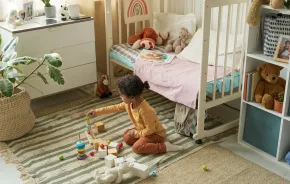
When I was pregnant with my second child, my sister asked whether he would share my daughter’s room.
My mind leapt to a life of little sleep, irregular routines, and incessantly removing my nearly 2-and-a-half-year-old toddler from the crib before she smooshed the newborn like a little pancake. Plus, this is 2018, not the Darling nursery (though I do wish my dog would clean and make tea). Children need their own room... right?
Maybe not. Could it be, even if we have the space, sharing a room may lead to well-rounded, well-adjusted, connected kids?
Our son Z was born in summer and M could not be more excited to have a real-life baby in the house. Z slept in our room for the first five months and through a move when he was only 2 weeks old.
Settling into our three-bedroom bi-level (and surviving breastfeeding, hormones and a tireless toddler), I spent hours decorating the Z’s nursery with modern-woodsy touches and M’s mermaid room with pink Jefferson Airplane records. Even though the family room doubled as my office space and a playroom, I never even entertained the kids sharing a room.
Every week Z grew older, he and his sister’s bond became more evident. By 6- and 34-months they developed a rapport solely their own. They made each other laugh. M sang lullabies when Z cried and Z tempered M’s tantrums.
In many societies where co-sleeping is the norm, there appears to be less intergenerational conflict.
As M approached her third birthday, I realized keeping their rooms separate may be keeping them separate, not just spatially but emotionally. What if I was stunting something wonderful if I didn’t give room-sharing a shot?
In his book, “Wild Nights: How Taming Sleep Created Our Restless World,” Benjamin Reiss examines the “historical anomaly” of separate sleep and how it affects everything from familial relationships to carbon footprints; as families grow so do bedrooms, house sizes and the use of natural resources.
“The big mystery for me is why do people not even think it’s a decision,” Reiss asks.“As a new parent, where are you in human history?”
The question resonates.
Professor and chair of English at Emory College, Reiss looks at “pressure points” throughout history, particularly at the turn of the 20th century, when Western ideals, health concerns and industrial wealth were at the forefront of medical, psychological and sociological research. Co-sleeping became a practice associated with primitive “savages” and poverty, while individualized bedrooms became a necessity for the “civilized” world.
From this, a new nightly routine blossomed and bedtime stories tucked children tight into their own rooms, away from the rest of the family.
With the internet providing boundless parenting philosophies, however, and as millennials shift into childrearing roles, perhaps some of the pressure placed on separate sleep will be lifted — or at least questioned — and we’ll gain insights into the pros and cons of sleeping alone and together.
“In many societies where co-sleeping is the norm, there appears to be less intergenerational conflict. Instead of having a nightly ritual of separation, it becomes a time of emotional bonding across generations,” Reiss says, citing anthropologists Carol Worthman and Ryan Brown. “You have to have a looseness about time schedules though. When parents are worried about getting everyone on a schedule — it’s harder.”
Reiss speculates whether room-sharing may lead to children who “fight a bit less, share a bit more and care for others as much as they care for themselves,” but he remains realistic in the flexibility it requires, and may not be for everyone (he admits his grown children never shared a room).
But as a mom of two amazing children who wake through the night, it’s hard to ignore thousands of years of successful sleep traditions preceding me. And as I combine mermaids and woods into a single space, I find myself romanticizing one bedroom where our whole family dozes off together — just listening to the white noise of each other’s breath.











